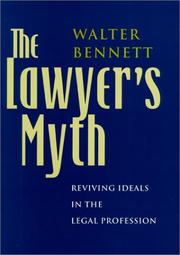| Listing 1 - 3 of 3 |
Sort by
|

ISBN: 1282537601 9786612537608 0226042561 9780226042565 9780226042558 0226042553 9781282537606 6612537604 Year: 2001 Publisher: Chicago (Ill.) University of Chicago Press
Abstract | Keywords | Export | Availability | Bookmark
 Loading...
Loading...Choose an application
- Reference Manager
- EndNote
- RefWorks (Direct export to RefWorks)
Lawyers today are in a moral crisis. The popular perception of the lawyer, both within the legal community and beyond, is no longer the Abe Lincoln of American mythology, but is often a greedy, cynical manipulator of access and power. In The Lawyer's Myth, Walter Bennett goes beyond the caricatures to explore the deeper causes of why lawyers are losing their profession and what it will take to bring it back. Bennett draws on his experience as a lawyer, judge, and law teacher, as well as upon oral histories of lawyers and judges, in his exploration of how and why the legal profession has lost its ennobling mythology. Effectively using examples from history, philosophy, psychology, mythology, and literature, Bennett shows that the loss of professionalism is more than merely the emergence of win-at-all-cost strategies and a scramble for personal wealth. It is something more profound-a loss of professional community and soul. Bennett identifies the old heroic myths of American lawyers and shows how they informed the values of professionalism through the middle of the last century. He shows why, in our more diverse society, those myths are inadequate guides for today's lawyers. And he also discusses the profession's agony over its trickster image and demonstrates how that archetype is not only a psychological reality, but a necessary component of a vibrant professional mythology for lawyers. At the heart of Bennett's eloquently written book is a call to reinvigorate the legal professional community. To do this, lawyers must revive their creative capacities and develop a meaningful, professional mythology-one based on a deeper understanding of professionalism and a broader, more compassionate ideal of justice.
Lawyers --- Practice of law --- legal profession, lawyer, power, corruption, literature, mythology, psychology, philosophy, history, professionalism, wealth, ambition, kill all the lawyers, heroism, masculinity, trickster, archetype, nonfiction, justice, femininity, authority, practice, morality, judges, technicalities, ethics, thomas jefferson, john adams, founding fathers, lincoln.
Book
ISBN: 0520943821 9780520943827 9780520245266 0520245261 9780520257566 0520257561 Year: 2009 Publisher: Berkeley University of California Press
Abstract | Keywords | Export | Availability | Bookmark
 Loading...
Loading...Choose an application
- Reference Manager
- EndNote
- RefWorks (Direct export to RefWorks)
From the simple assertion that "words matter" in the study of visual art, this comprehensive but eminently readable volume gathers an extraordinary selection of words—painters and sculptors writing in their diaries, critics responding to a sensational exhibition, groups of artists issuing stylistic manifestos, and poets reflecting on particular works of art. Along with a broad array of canonical texts, Sarah Burns and John Davis have assembled an astonishing variety of unknown, little known, or undervalued documents to convey the story of American art through the many voices of its contemporary practitioners, consumers, and commentators. American Art to 1900 highlights such critically important themes as women artists, African American representation and expression, regional and itinerant artists, Native Americans and the frontier, popular culture and vernacular imagery, institutional history, and more. With its hundreds of explanatory headnotes providing essential context and guidance to readers, this book reveals the documentary riches of American art and its many intersecting histories in unprecedented breadth, depth, and detail.
Art, American. --- Art, American --- 18th century american art history. --- 19th century american art history. --- african american art. --- american art. --- art. --- artists. --- benjamin west. --- chester harding. --- cotton mather. --- historical. --- institutional history. --- john adams. --- john durand. --- john singleton copley. --- john smibert. --- john valentine haidt. --- native american artists. --- painters. --- paintings. --- peter pelham. --- popular culture. --- puritanism. --- quakers. --- regional artists. --- sculptors. --- stylistic manifestos. --- theory of painting. --- thomas smith. --- vernacular imagery. --- visual art. --- women artists. --- works of art.
Book

ISBN: 0271059311 0271060301 0271060298 9780271060293 9780271059310 9780271058313 0271058315 9780271060309 9780271053875 0271053879 0271069414 Year: 2015 Publisher: University Park, PA
Abstract | Keywords | Export | Availability | Bookmark
 Loading...
Loading...Choose an application
- Reference Manager
- EndNote
- RefWorks (Direct export to RefWorks)
"A collection of essays examining citizenship as a discursive phenomenon, in the sense that important civic functions take place in deliberation among citizens and that discourse is not prefatory to real action but in many ways constitutive of civic engagement"--Provided by publisher.
Political participation. --- Deliberative democracy. --- Citizenship. --- Citizen participation --- Community action --- Community involvement --- Community participation --- Involvement, Community --- Mass political behavior --- Participation, Citizen --- Participation, Community --- Participation, Political --- Political activity --- Political behavior --- Political rights --- Social participation --- Political activists --- Politics, Practical --- Discursive democracy --- Democracy --- Birthright citizenship --- Citizenship --- Citizenship (International law) --- National citizenship --- Nationality (Citizenship) --- Political science --- Public law --- Allegiance --- Civics --- Domicile --- Law and legislation --- Deliberative democracy --- Political participation --- Bart van Klink. --- Christian Kock. --- Georgia Warnke. --- Hansen John Adams. --- Italo Testa. --- James McDonald. --- Jette Barnholdt. --- Just Jonas Gabrielsen. --- Kasper Møller Hansen. --- Lisa S. Villadsen. --- Manfred Kraus. --- Niels Møller Nielsen Marie Lund Klujef Ildikó Kaposi Kristian Wedberg Berit von der Lippe. --- Oliver W. Lembcke. --- Paula Cossart. --- Sine Nørholm. --- Stephen West. --- Tatiana Tatarchevskiy. --- William Keith. --- rhetorical agency Christian Kock.
| Listing 1 - 3 of 3 |
Sort by
|

 Search
Search Feedback
Feedback About UniCat
About UniCat  Help
Help News
News